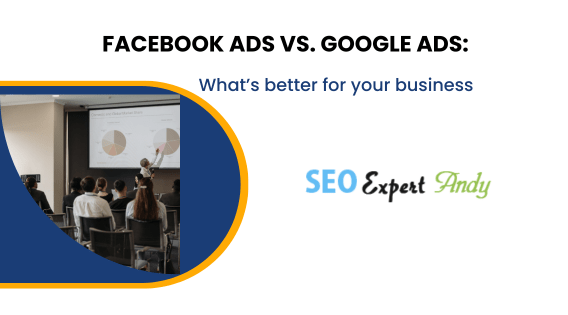What are Facebook Ads?
Facebook Ads are targeted advertisements created and managed through Facebook. Exploring the vast user base and engagement on the social media platform, businesses and individuals can design diverse ad formats, including images, videos, and carousel ads. With accurate audience targeting based on demographics, interests, behaviors, and more, advertisers can reach specific user groups likely to engage with their content. The ads can appear in users’ News Feeds, Stories, and other placements and drive brand awareness, engagement, website traffic, and conversions. Facebook Ads provide comprehensive performance metrics. It enables advertisers to optimize campaigns for better results. This powerful tool empowers businesses to connect with their desired audience and achieve various marketing goals in the digital landscape.
What is Google Ads?
Google Ads, previously popular as Google AdWords, is a digital advertising platform created by Google. It allows businesses to create and display targeted ads on Google’s search engine results pages (SERPs) and across its extensive Display Network, like websites and apps. Advertisers bid on specific keywords related to their products or services, and when users search for those keywords, the ads appear prominently. Google Ads supports user intent and allows businesses to connect with potential customers. The platform offers text-based ads, responsive ads, and display ads, with various customization options. Advertisers can set budgets, bidding strategies, and geographic targeting. All these features make Google Ads a powerful tool for driving traffic, conversions, and brand visibility in the digital marketplace.
5 Major Distinctions between Facebook Ads and Google Ads
In the active scenery of digital advertising, Facebook Ads and Google Ads are the two main platforms. Each offers distinct advantages to reach your target audience. Understanding the key differences between them helps you make informed decisions about where to invest to succeed in your business.
Explore five fundamental differences that set Facebook Ads and Google Ads apart:
1: Audience Intent and Targeting
Facebook Ads: Facebook is a social platform where users engage with friends, family, and content they find interesting. This setting allows high targeting based on user interests, behaviors, demographics, and even life events. Businesses can create ads based on personal preferences. It is effective for building brand awareness and generating interest.
Google Ads: Google is a search engine. Users use it with specific intent, like actively searching for solutions, products, or information. Google Ads support this intent by displaying ads that resonate with a user’s search query. It is a powerful tool for capturing audiences who are already seeking what you offer.
2: Ad Formats
Facebook Ads: Facebook offers diverse ad formats, including image ads, video ads, carousel ads, and storytelling options. These visually appealing formats help businesses connect with users on an emotional level and promote brand loyalty and engagement.
Google Ads: Google’s primary ad format is text-based, with concise and relevant information to offer directly to users. While Google has expanded into responsive and display ads, the formats are generally less visually engaging compared to Facebook.
3: Cost Structure
Facebook Ads: The cost structure of Facebook ads is based on a bidding system, where advertisers compete for ad space. Generally, the cost per click (CPC) on Facebook is more likely lower than on Google Ads. This can be advantageous for businesses with fixed budgets.
Google Ads: Google’s cost structure is also bid-driven. Due to the high-intent nature of search queries, certain keywords can be extremely competitive. The result is higher CPCs. However, the potential for conversions might be higher. It seems expensive for some businesses.
4: Advertising Goals
Facebook Ads: Facebook is ideal for businesses to create brand awareness, engage with their audience, and build a loyal customer base. It’s good for businesses with visually appealing products or services that can be shown through images and videos.
Google Ads: Google is more focused on driving immediate conversions and capturing users who want to make a purchase or take a specific action. It is a valuable tool for businesses to target users who are actively searching for what they offer.
5: Ad Placement
Facebook Ads: Facebook offers various ad placements within users’ News Feeds, Stories, and the right-hand column on the desktop site. These placements help in seamless integration with users.
Google Ads: Google Ads appear on search engine results pages (SERPs) when users search for relevant keywords. Google offers ads on websites and apps that are part of the Google Display Network, expanding your reach to a wider online audience.
Also, Read
SEO Vs PPC: Which Is Best for Your Brand?
The choice between Facebook Ads and Google Ads depends on your specific business goals, target audience, and budget. Facebook is excellent at building brand awareness and engagement through visually appealing content and accurate targeting. Alternatively, Google Ads benefit from immediate conversions through strategically placed ads in search results. Consider your objectives and audience preferences to determine which platform is better for your advertising strategy. A balanced approach, like utilizing both platforms, might bring the best results to your business.
